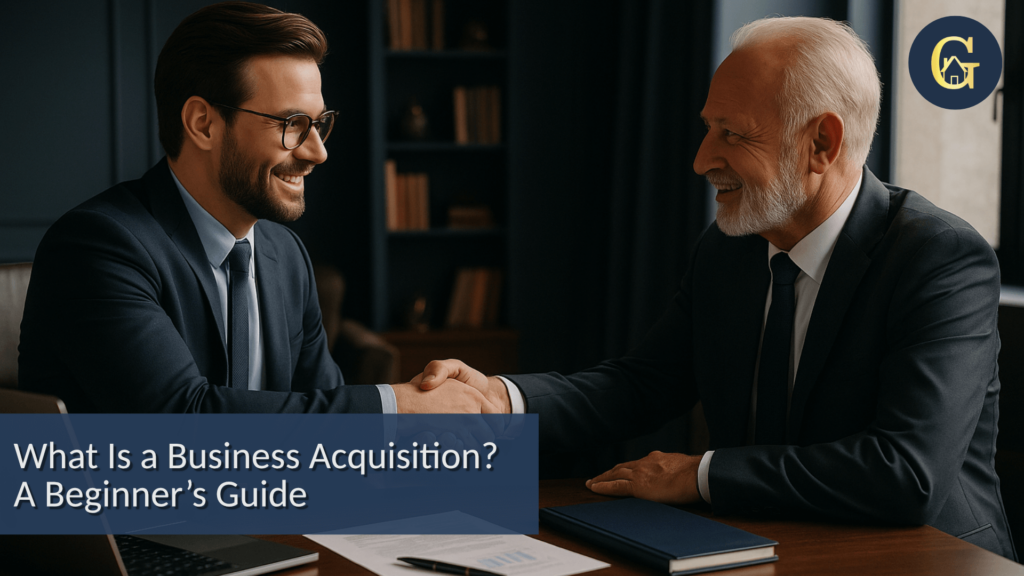For many entrepreneurs, the fastest way to grow a company isn’t starting from scratch, it’s buying an existing one. But if you’ve never done it before, the term “business acquisition” can feel overwhelming. How does it work? What are you actually buying? And when is it the right move?
In this guide, we’ll break it down clearly, so you can make smart, strategic decisions and feel confident starting your acquisition journey.
Whether you’re a property investor looking to diversify, a director expanding into new markets or a Dubai-based entrepreneur building UK roots, understanding business acquisitions is a powerful step toward long-term wealth.
What Counts as a Business Acquisition?
A business acquisition is when one person or company purchases most or all of another business to take control of it. This could be through:
- Buying the company outright
- Purchasing its assets (like stock, IP, or property)
- Acquiring shares in the company
It’s a strategy used to accelerate growth, enter new markets, acquire talent or systems and increase overall value, often faster than organic growth.
Key Types of Acquisitions (Share vs. Asset Purchase)
There are two common ways to acquire a business:
1. Share Purchase:
You buy the company by purchasing shares (usually 100%). You take on everything, including assets, liabilities, contracts, staff and trading history. This is more common when the company is trading well and the buyer wants continuity.
2. Asset Purchase:
You buy specific parts of the business (e.g. stock, equipment, customer lists or property), but not the legal entity itself. You don’t take on liabilities or the full history, so it’s often used when de-risking is important.
Each option has its tax and legal implications, so it’s vital to structure the deal based on your goals, especially if you’re using an SPV, trust or holding company.
Who Typically Buys Businesses and Why?
You don’t need to be a major corporation to buy a business. At GoldHouse, we support:
- Property investors acquiring construction or lettings firms
- Entrepreneurs expanding into complementary markets
- Directors rolling up smaller companies under one group
- Expats investing in UK businesses for long-term income
People buy businesses to:
- Scale quickly
- Gain cash flow from day one
- Diversify across sectors
- Acquire undervalued assets
- Build a legacy or generational wealth strategy
Done well, acquisitions create more than just profit, they build freedom, resilience and lasting value.
What Happens During the Acquisition Process?
A typical process includes:
- Initial Research & Deal Sourcing You identify potential opportunities – directly or through a broker or advisor.
- Due Diligence Legal, financial, and operational checks to understand the risks, liabilities, and potential of the business.
- Negotiation & Offer You agree on price, payment terms and legal structure.
- Completion & Transition Legal documents are signed, money changes hands and ownership transfers. Post-deal, there may be a handover period.
Throughout the process, your accountant should help you model cash flow, plan the structure and protect your personal assets and tax position.
Common Misconceptions About M&A
- “I need millions to acquire a business.”
Many deals are done through seller financing, deferred payments or private capital.
- “It’s too complex for a small investor.”
With the right support, acquisitions can be more strategic and secure than high-risk startups.
- “I’ll inherit all the debt.”
Not necessarily, asset purchases and holding company structures can protect you.
The key is understanding your options and structuring the deal wisely.
When Should You Consider Buying a Business?
You might be ready to acquire if:
- You want to scale faster than organic growth allows
- You’ve mastered one company and want to expand
- You’re building a group or legacy model
- You’re diversifying a property or investment portfolio
- You’re moving from the UAE to the UK and want cash-flowing assets
It’s not about buying just any business, it’s about choosing the right one, with aligned goals and using the right financial and legal structure.
Final Thoughts: Starting Your Acquisition Journey
A business acquisition doesn’t have to be risky or confusing. With the right guidance, it can be one of the smartest ways to build wealth, secure your family’s future and gain greater control of your time and income.
At GoldHouse, we help you:
- Identify the right structure (SPV, SSAS, holding company)
- Navigate tax, due diligence and risk
- Align your acquisitions with long-term wealth strategy
- Build a sustainable group model in the UK or across borders
Ready to explore the world of business acquisitions with expert support?
GoldHouse is here to help you gain clarity, minimise tax stress and confidently step into your next chapter. Let’s build something that lasts.



